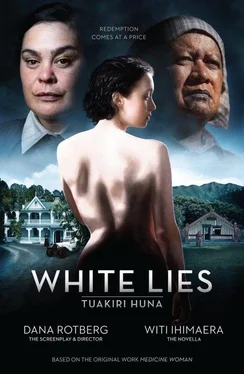Maraea followed her, but suddenly turned to Paraiti. ‘She will kill the baby,’ she said, angrily, ‘make no mistake about it. If she kills herself in doing it, well — if the baby is born, her life will be destroyed anyhow. Mark my words, you will be as much to blame if you do not help her.’
You doctors, you’re all the same, I urinate on all of you.
Paraiti asked the question, even though she already knew the answer. ‘He Maori ia?’
‘Yes,’ Maraea answered. ‘She is Maori.’
‘But the painting in the house … is that not her mother?’
‘Yes, it is her mother,’ Maraea said.
‘Then how …’
But Maraea had already gone.
It is another dawn and Paraiti drags her old bones up from sleep.
She raises her hand in prayer, ‘Kororia ki to ingoa tapu, glory be to Thy holy name,’ and praises God again for the gift of life and the joy of another day. What greater blessing could humankind receive than to be able to live and breathe, here, on the bright strand between earth and sky?
Of course, the charge against Paraiti could not be sustained. Despite Rebecca Vickers’ insistence that Paraiti remain in jail, Harry McIntosh said that an exhaustive search of the two-room kauta at Waituhi had failed to find the bracelet.
As soon as she was released, Paraiti began her travels.
And now three weeks have passed since Paraiti was in Ruatahuna.
On her last day there she had presented Horiana with the bloomers she had bought for her in Gisborne. Horiana had loved them: ‘They’re so pretty, it’s such a shame to wear them under my dress! Why don’t I wear them on the outside?’
Pulling Kaihe after her and with Tiaki on guard, Paraiti had visited the sick, wounded and elderly of Ruatoki, Waimana and Murupara.
Then, her heart lifting, she set off for Te Kuiti.

It was so wonderful for Paraiti to be back among the people who had given sanctuary to her and Te Teira those many years ago. No sooner was she seen entering the village than young children ran up to her, yelling, ‘Paraiti! Scarface! You’re back!’ Even the old chief, Whaturangi, came forward to greet her and tell her to pitch her tent close to Te Tokanganui a Noho, the great Ringatu meeting house.
‘Your father would be cross with us if we didn’t acknowledge you,’ her cousin Peti growled, ‘and there are enough angry ghosts floating around us as it is.’ Just as Horiana had been Paraiti’s assistant in Ruatahuna, so was Peti in Te Kuiti, and she was just as bossy.
Later that evening, in Paraiti’s honour, a special remembrance service was held for Te Teira. Sitting in the meeting house, within the latticed walls and with the beautiful painted kowhaiwhai rafters soaring above her, Paraiti again honoured the morehu, the loyal remnants of Te Kooti’s followers, survivors in a changing world. And always, she thought of her beloved father and his stories of the prophet Te Kooti.
Te Teira spoke in the words of the Old Testament, likening Te Kooti’s exploits to the great exodus and the flight of the Israelites from the lands of Egypt into Canaan. It was all metaphorical talk, but Paraiti was moved by its grandeur and imagery. ‘In the end Te Kooti was pardoned,’ Te Teira had told her one day. ‘I will tell you how. The government wanted to run a railway line through the King Country, and issued a general amnesty to all criminals, no matter what they had done, to secure the land. The prophet was saved by the iron horse!’ he laughed.
‘It was 1884 when that railway opened,’ Te Teira went on. ‘You and I were travelling to some Ringatu gathering or other. I can’t remember which one, but you were my right-hand man, do you remember? We came across some Maori boys bending over the rails listening. We got off our horses, too, and bent down and listened. And your eyes went big and wide and you said to me, “Papa, the rails are singing a strange waiata!” Then suddenly, around the corner came that iron horse, a huge ngangara, a monster, belching smoke and roaring at us. Our horses started to buck and bolt, but, resolute in the face of the ngangara, you raised your rifle and fired a shot at it.’ Te Teira laughed. ‘I suppose you were still trying to protect your papa, ne?’
Paraiti’s shot did not bring the ngangara to the ground. But as it swayed and slithered past, she saw the many men and women who had been eaten by it, imprisoned in its intestines. She raised a tangi to them, a great lament. Of course, she had been mistaken. The passengers in the train were very much alive — and the ngangara was just another monster eating up the land.

It was in Te Kuiti that Paraiti had grown into womanhood. Although Te Teira would have wished for her to marry some kind farmer or fisherman of the tribe, raise children and live a happy life, those choices were closed to her because of her kanohi wera, her burnt face. No matter that he was revered as a tohunga; even his great mana could not obtain a husband for her. She was twenty-four and already habituated to rejection when, in a terrible moment of truth, she asked, ‘Papa, what man, in the moment of ecstasy when making love to me, would look upon my face and not wish it was someone else’s?’ Te Teira himself acknowledged that his daughter was destined to become a spinster, with no provider once he was gone.
But the lives of father and daughter were happy. The only serious threat came when Te Teira had to go underground as legislation was passed against ‘charlatan’ tohunga. He continued to practise covertly, and he taught his daughter the arts of healing so that she could earn her own living. In particular, he bequeathed to her the rare skill of Maori massage, and the patience to work deep beneath the skin and move muscles and bones and tissue to their proper places, should they be broken, torn or out of alignment.
And when Te Teira was dying of the flu, Paraiti was still massaging him and trying to keep his circulation going long after he became cold.
‘Please don’t leave me, Father. Please …’

A stream of patients waited for a consultation, with Peti at the flap of the tent.
A child with chronic asthma will now breathe more easily if he follows the regime of herbal inhalants and exercises that Paraiti has given his anxious parents. The child’s young mother had prevailed upon her husband to travel by car from Rotorua on the basis of Paraiti’s reputation. ‘You took him to the Pakeha doctors and only now you come to see me?’ Even so, she grumpily began her diagnosis and, satisfied with it, trickled manuka honey down the child’s throat. ‘This will soften the mucus.’
She instructed the parents to construct a makeshift sweat tent and fill it with constant steam by boiling water inside the flaps; all the while she continued to trickle the honey — the child sucked on Paraiti’s finger as if it was a teat. Oh, to have been a mother!
Three days later, Paraiti put the hook of her little finger down the child’s tiny throat and pulled, and strings of softened phlegm came with it. ‘Go out into the world now, child,’ she blessed him, ‘and claim it.’
A young girl was brought in covered in pustules; Paraiti looked after her during the night, using her poultices to draw out the pus and her soporifics to bring down the girl’s fever. And if Paraiti was not able to cure all those who sought her help, at least she had tried to make them more comfortable.
Читать дальше













